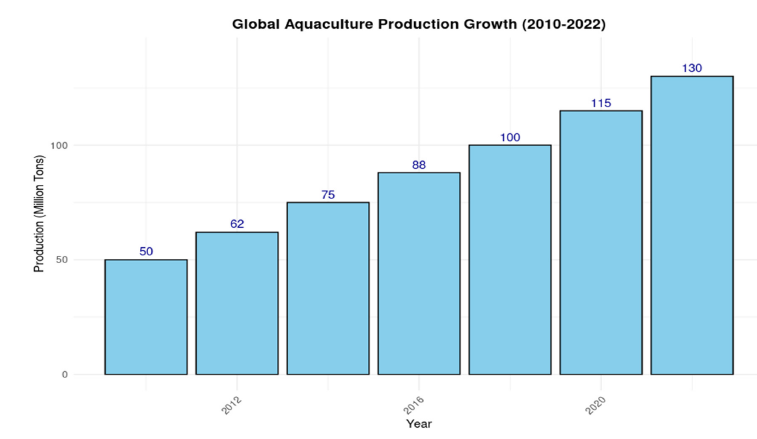- Submissions

Full Text
Orthoplastic Surgery & Orthopedic Care International Journal
The Convergence of Marine and Molecular Biology: Revolutionizing Aquaculture and Fisheries Sustainability
Sumit Kumar*1, Akshata Soratur2 and Ajit Kumar2
1Department of Industrial Fish and Fisheries, Babasaheb Bhimrao Ambedkar Bihar University, India
1Department of Ocean Studies and Marine Biology, Pondicherry Central University, Port Blair 744103, India
*Corresponding author: Sumit Kumar, Department of Industrial Fish and Fisheries, Babasaheb Bhimrao Ambedkar Bihar University, Muzaffarpur 842001, India
Submission: May 09, 2025;Published: May 22, 2025

ISSN 2578-0069Volume3 Issue2
Introduction
Demand for marine protein is growing at an unprecedented rate. Meanwhile, wild fisheries are declining due to over exploitation, habitat degradation and climate change. Conventional aquaculture is laden with problems of operational efficiency and unsustainable practices. We propose the application of molecular biology to marine systems-new pathways for sustainable aquaculture and fisheries that transform food production while preserving the environment.
Core Concepts: Merging Molecular Tools with Marine Systems
Innovations in molecular biology are transforming aquaculture. Sequence genomics enables scientists to trace the genomes of certain species such as Atlantic salmon and isolate critical genes for pathogen resistance and growth rate enhancement. Genomic data anguished selective breeding lessens antibiotic dependence while improving yields. CRISPR-Cas9 is being applied to make cold tolerant Pacific cod or to create herbivorous tilapia requiring less wild-caught fishmeal. A 2021 study showed a 40% decrease in mortality rates due to CRISPRenhanced disease resistance in farmed shrimp. Without altering the salmon’s genes, RNAi technology scrambles viral genes responsible for Infectious Salmon Anemia (ISA) enabling silencing and thus protection of the salmon. Sustainability of feeds is another important focus area. Algae-based feeds, as well as Genetically Modified (GM) crops such as high oleic acid derived from camelina oil, are alternatives to fish meal. They decrease the pressure on stocks of wild forage fish and the carbon footprint linked to aquaculture.
Challenges in Implementation
Despite progress, molecular approaches face hurdles. High R&D costs, regulatory barriers for GMOs and public skepticism pose significant challenges. Ethical concerns, such as gene escape into wild populations, demand robust containment strategies, like sterile triploid salmon.
Ethics, Equity and Fisheries Integration
Environmental and social equity are paramount. Containment of GM organisms is critical to prevent ecological disruption. Closed-containment systems and sterile stock are essential measures. Innovations must prioritize low-income coastal nations. Partnerships between institutions like WorldFish and local communities can democratize access to molecular tools. Molecular biology is also revitalizing wild fisheries. Molecular markers identify genetic diversity in depleted species like bluefin tuna. Hatcheries can release genetically diverse juveniles to restore populations. Genomic studies predict species’ vulnerability to ocean acidification (e.g., oysters) and inform conservation strategies (Figure 1).
Figure 1:Global aquaculture production growth from 2010 to 2022: The data highlights the increasing trend in production, measured in million tons, with projections for future growth also included.

Future Directions
The future of marine biology and molecular integration holds immense potential. Synthetic biology, such as lab-grown seafood (e.g., cultured tuna) and bioengineered artificial reefs, could reduce fishing pressure. Policy frameworks must adapt to biotech advancements. Harmonized global regulations, such as the FAO’s code of conduct for responsible fisheries are essential.
Conclusion
The synergy of marine and molecular biology presents a pathway to sustainable aquaculture and fisheries. Success depends on transparent ethics, equitable technology access and interdisciplinary collaboration. By prioritizing innovation alongside conservation, we can secure marine ecosystems and global food security for future generations.
 a Creative Commons Attribution 4.0 International License. Based on a work at www.crimsonpublishers.com.
Best viewed in
a Creative Commons Attribution 4.0 International License. Based on a work at www.crimsonpublishers.com.
Best viewed in 







.jpg)






























 Editorial Board Registrations
Editorial Board Registrations Submit your Article
Submit your Article Refer a Friend
Refer a Friend Advertise With Us
Advertise With Us
.jpg)






.jpg)














.bmp)
.jpg)
.png)
.jpg)










.jpg)






.png)

.png)



.png)






